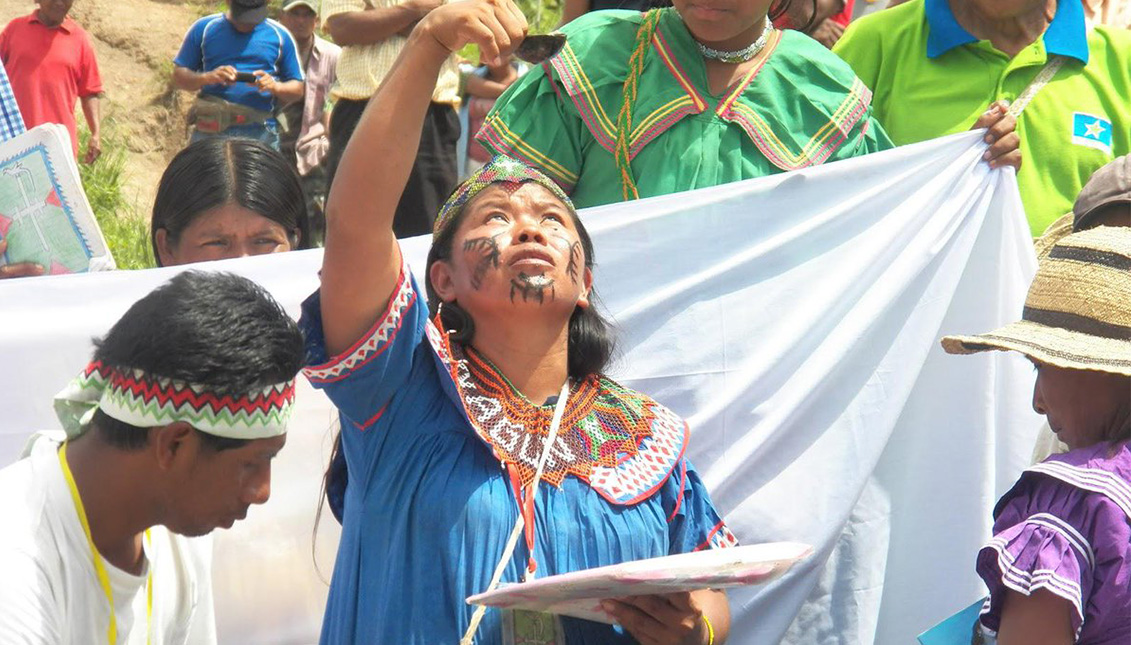
Mama Tatda, the Panamanian church that the Virgin "freed" from "the colonists" in the 60s
The Ngäbe-Bugle natives celebrate the anniversary of a curious syncretic religion in the context of a violent series of sectarian murders in the jungle.
In the thick vegetation of the jungle, chants climb the trees. At first you hear a "Cantale!" ('hallelujah') and then a hundred men and women dressed in colorful costumes clap their hands and take a step to each side.
They are the Ngäbe-Bugle people, who live in western Panama and celebrate 58-years anniversary of when they were "freed" by Mama (the Virgin Mary) Tatda (father, Jesus Christ) from colonists to lead them "on the path of faith."
It's a curious syncretism of Catholic and Amerindian cults practiced by almost half of the nearly 250,000 inhabitants of the Ngäbe-Buglé region, and is an official religion, per its organic charter from 1999.
This was assured to EFE by the native authorities, who guide a ceremony where the faithful kneel on the muddy ground — it is the rainy season — and paint geometrical figures on their faces and praise nature while preaching "the word of Jesus" in their Ngäbere language.
It's been happening since 1962, when Mama Tatda appeared, according to the story, to an indigenous woman, Delia Bejarano from Atencio, to reveal the straight path to her.
Delia's indigenous name was Besikö Kruningrobu and when she died in 1964 at the age of 23, her daughter Emilce, who was only two years old, became her heir.
Today, Emilce heads the church located in the depths of the region that also has powerful leaders like Clementina Perez.
RELATED CONTENT
The Ngäbe-Bugle was a "humble and massacred people until Mama Tatda came down and said she was going to free us and asked to fulfill her mandate so that the world would continue," Emilce, hidden behind her mask, explained to EFE.
The woman is a well-known activist who fights against police violence and for the preservation of nature and the life of the congregation. In 2015, she took to the streets to fight the construction of a hydroelectric plant and is still there today, camping next to her people on the banks of the Tabasará River, where a petroglyph considered sacred by the community was "flooded" by the dam.
Last Sept. 22, during the celebrations of Mama Tatda's "descent," the whole community of Los Angeles — on the border with Costa Rica — became a rumor of songs and curious signs of the cross on the waist, shoulders and head.
Meanwhile, the followers of Mama Tatda, who prohibit among other practices the consumption of alcohol and polygamy, tried to dissociate themselves from the dark memory of the sectarian massacres in the area that have caused the death of at least eight people, almost all women and children.
Like the five minors held by an alleged "messiah" who abused them, or the ferocious exorcisms performed by one of the sects in the region. The members of 'La nueva luz de Dios,' in fact, are still being investigated by the Panamanian Prosecutor's Office for the murder of a pregnant woman, her five children and a teenage girl last January. Their bodies were found in a grave.
Now, in addition to the fear of these other sectarian cults with which they share territory, there is the COVID-19 pandemic, which has in Ngäbe-Buglé, one of the most devastated spots in the country.
Mama Tatda's children look at the sky, prostrate themselves on the ground and ask the hybrid divinity to protect them as it has done for almost six decades now.











LEAVE A COMMENT:
Join the discussion! Leave a comment.